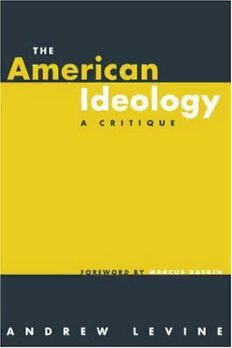
The American Ideology: A Critique (Pathways Through the Twenty-First Century) PDF
93 Pages·2004·1.319 MB·English
Most books are stored in the elastic cloud where traffic is expensive. For this reason, we have a limit on daily download.
Preview The American Ideology: A Critique (Pathways Through the Twenty-First Century)
Description:
Every school of thought in the social sciences appeals, in one way or another, to the idea of Reason. The American Ideology explicates and criticizes two notions of Reason in society: efficiency (as the term is used in economics and related policy discussions) and the concept of 'the reasonable' (employed in the strain of liberal political philosophy inaugurated by John Rawls). Despite their cogency and considerable appeal, these notions nowadays underwrite an orientation towards public policy and political life that is both inadequate and beneficial to elite interests; an orientation that constitutes a distinct 'American Ideology.' To make this case, Levine traces the history of the concept of efficiency, from Hobbes, through the utilitarian tradition, to contemporary economic and philosophical paradigms, and examines the strengths and weaknesses of the democratic theory implicit in John Rawls's pioneering work on justice and political legitimacy. The result is a critical, but sympathetic 'immanent critique' of the American Ideology, focused on the prospects for its reconstruction.
See more
The list of books you might like
Most books are stored in the elastic cloud where traffic is expensive. For this reason, we have a limit on daily download.
